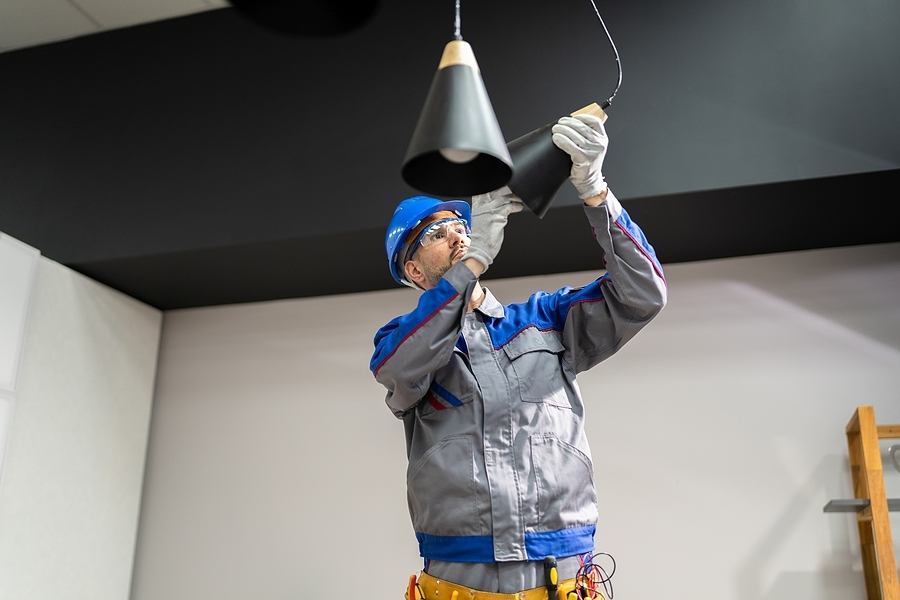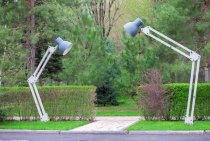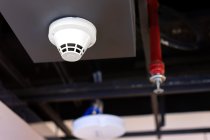What Causes Light Turning On and Off By Itself?

August 19, 2025
What Causes Light Turning On and Off By Itself?
Have you noticed your lights flickering or switching on and off unintentionally? While this might be frightening, don't blame ghosts—there could be several legitimate explanations for why this happens. Neighborhood Electric is here to help you understand these things. It might help you determine when calling an electrician or scheduling lighting repair services will be necessary.
Loose Connections
One of the primary factors contributing to lights turning on and off unintentionally is loose connections in your circuit - from your light fixture to wall wiring and electrical outlets in your walls. A loose wire could allow electricity to arc, making your lights flicker or blink rapidly off and on; this is irritating and could pose a severe fire risk, too! If this issue arises, please contact an electrician as soon as possible to conduct an evaluation and review your wiring.
Faulty Light Switch
Another possible culprit could be an improper-functioning light switch. Over time, its internal parts can wear down or loosen, resulting in intermittent contact that causes your lights to flicker on and off by themselves. Although replacing an inadequate switch should be a relatively straightforward task for anyone handy with tools, professional advice from an electrician is recommended to replace and wire new switches into place without risk safely.
Bulb Problems
Sometimes, the source of electrical system troubles lies outside your walls - particularly with light bulbs. Loose bulbs or those nearing their end-of-life span could cause flickering by loosening, leading to flickering flickers emitted. Make sure all bulbs are tightly fitted into place before replacing older bulbs if that doesn't help resolve your issues; otherwise, consider calling lighting repair services or consulting other sources as possible solutions for further assistance.
Circuit Overload
An electrical system overload can make lights flicker or flick on and off unexpectedly. This usually occurs when too many devices draw power from one circuit simultaneously. For instance, having high-wattage appliances like microwaves or air conditioners on this same circuit with your lights could result in fluctuations in power usage resulting in fluctuations. An electrician can assist by redistributing load across more circuits or creating extra circuits to handle load levels better.
Electrical Interference
Interference from other devices may also make your lights act strangely, which is especially prevalent in older homes with outdated wiring systems. Modern appliances and gadgets may cause interference that disrupts electrical flow - if this seems likely, contacting a professional electrical repair service to inspect and test your wiring may provide solutions such as upgrading electrical panels and surge protectors as possible solutions.
Wiring Issues
Older homes frequently experience wiring problems that cause lights to flicker. As time passes, insulation wears away, resulting in short circuits or other electrical problems requiring extensive repairs or lighting replacement. An experienced electrician should assess your home's wiring system and suggest the most cost-effective course of action, making your electrical system safe and reliable.
Power Company Issues
Sometimes, the problem lies outside your home itself: equipment owned and managed by the power company might malfunction, leading to fluctuations in electricity supplies to your residence. If other residents in your neighborhood also report having similar experiences with fluctuations, that might be a telltale sign that something more sinister lies at work; in such a scenario, it would be wiser for you to report this directly so they may send out a technician as quickly as possible to address it.
Smart Home Devices
Are your lighting and smart home devices intertwined? Sometimes, glitches in these systems cause lights to switch on or off unexpectedly, leading to flickering lights in different rooms of the house or unexpected twitchy switching of bulbs on and off at random times. Review settings and upgrade any software to see if that resolves the issue—otherwise, contact customer support or an expert who specializes in smart home systems for further assistance if that does not.
Natural Causes
Take into account natural factors, like weather. Lightning strikes, high winds, or animals chewing wires could all cause the lights to flicker or switch on and off unexpectedly. Although you cannot control these events directly, regular inspections by an electrical repair service could help identify and rectify potential problems before they become more significant.
Neighborhood Electric
Identifying the root cause is essential if your lights are randomly turning off and on by themselves. Be it loose connections or switches malfunctioning due to wear-and-tear wear and tear or overloaded circuits, getting at the root will keep your home safe while providing consistent lighting levels. Feel free to contact Neighborhood Electric to diagnose and address this problem immediately or even replace lights if required. These steps can keep the brightness alive in your home while eliminating surprises!








